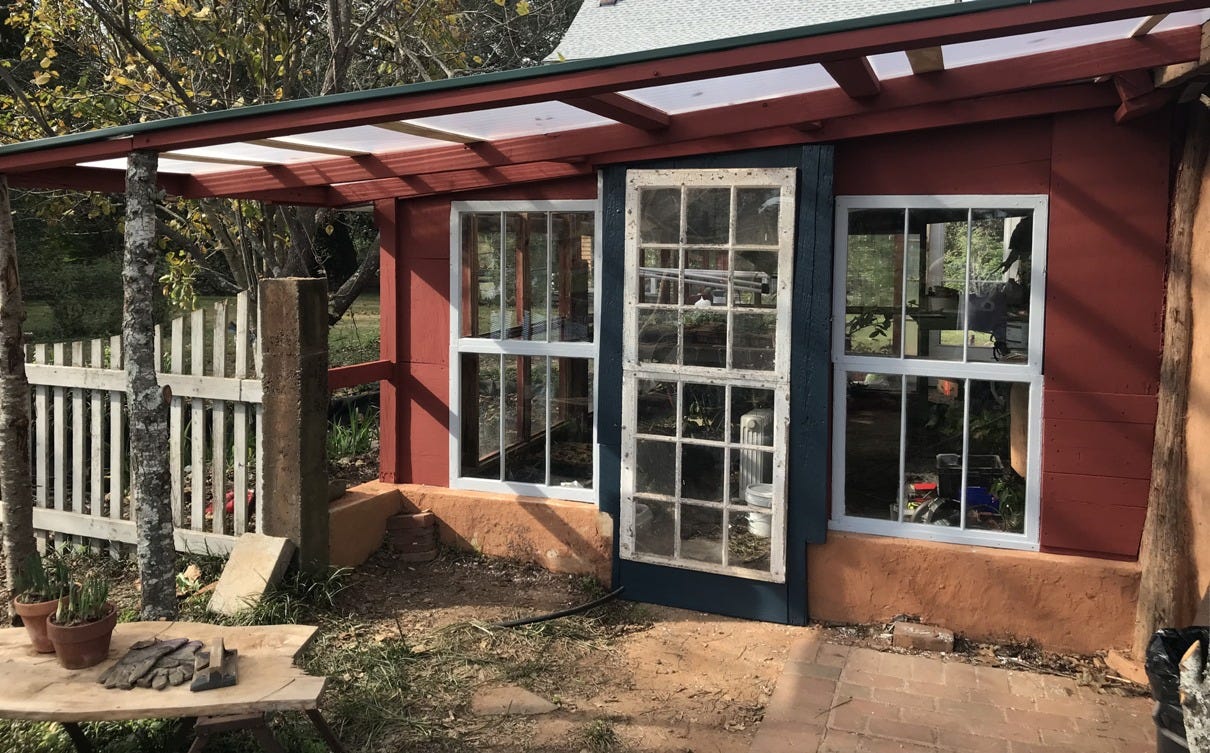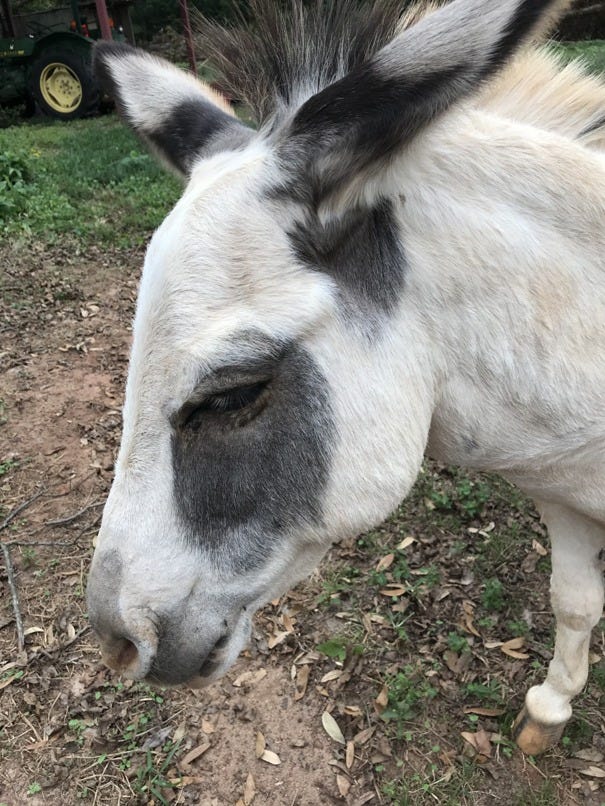“I love pruning muscadine,” Jenks says.
We walk out to a fencerow laden with vines. It’s an overcast January morning, the mercury is hovering around fifty degrees Fahrenheit, the wind is up and blowing, the clouds are forecast to move off by afternoon, and snow’s expected within the next forty-eight hours. Jenks and his husband Tom are leaving. As usual when they go, I’ve asked if there are any chores I can do around the farm in their absence.
“This is the perfect time to prune,” Jenks goes on. “Cut the vine any other time, and all the sap just oozes out.”
“But the cold weather’s going to stop that?” I guess.
“Right. The vine’s dormant.”
Pruning shears in hand, Jenks approaches a fat vine emerging from the ground near a fencepost.
“There’s a trunk, and then it branches off into these leaders. You’re going to cut back to the leaders, so a skeleton’s all that’s left. But not all the way back to the leaders.”
He reaches into the tangle of bare vegetation and grasps a shoot of vine.
“See these buds?” he asks, and I peer close. “You’ve got to leave two buds, so the plant has something to grow with, or we won’t get any grapes in the coming year.”
The shears go into the tangle, and Jenks makes a neat, angled cut in the shoot just above the second bud.
“If you can’t tell whether it’s a bud, it’s fine if there are three of them,” he adds. “I’ll come behind you and prune some more if it’s needed.”
Like cutting hair, I think. You can always take more off, but you can’t put it back.
“I’ll be conservative,” I promise.
I met Jenks last summer in Columbia when, after a stint teaching college (where I’d been a student long ago), I house-sat for a retired deacon while she attended an Episcopalian conference and visited her family up north. Our mutual friend, Janisse Ray, put Jenks and me in touch soon after my arrival in Columbia. For years, Jenks was the director of Riverbanks Botanical Garden, which he designed. Now, he grows crinum lilies, runs a gardening business serving clients around Augusta, and writes gardening books and a gardening newsletter on Substack in his spare time.
I hit it off with Jenks and Tom right away. Soon, Jenks began telling me about the new gardening book he was writing, and I proffered some advice. Leaving Columbia, I stayed a couple of months at Janisse’s organic farm in the Georgia backwoods, where I did some farm-handing, organized a new collection at the local county archives (where Janisse is the archivist), but mainly focused on Singular Dream, the Substack newsletter where I publish my sci-fi novel, Quibble. When I left Janisse’s farm in October and my next hop fell apart in very short order, Jenks invited me to stay in the cob house on his family farm in the South Carolina countryside just outside Augusta, Georgia. He asked me to perform music at garden club gatherings he was hosting. Then, thanks to my lack of other plans, what began as a two weeks’ stay stretched out into a few months, as he gave me some work around the farm and then engaged me to edit his book.
So, since early October, I’ve lived in the cob house here. Jenks and Tom split their time between the farm and elsewhere. The farm’s permanent resident is Jenks’s mother, Gloria, an octogenarian whose pastimes are working in the greenhouse and attending events for the local gardening club. She is rather private but quite a busy person for her age. I love her cooking.
Another fixture here is Linda, a neighbor who works at the Savannah River Site, helps out with the farm’s gardening, and regales us over supper with stories of her old hound dog Eddie. Once a week, Jenks’s sister Louisa and her husband Greg visit for supper, usually with their family in tow. Four generations dine under the same roof. Often, hired hands show up to help out on the farm. Between the family, neighbors, farm hands, and Gloria’s friends, the community centered on this farm is tight-knit and lively, full of comings and goings, chatter and gossip, usually about local people and events such as the closing of a highway for construction.
I envy them. I’m only a wayfarer here, warmly accepted as a friend but not a part of the family. In fact, since my work on the book is wrapping up and Jenks has no other work for me on the farm, I’ll be leaving soon. I don’t know yet where I’ll go. Probably to Florida, at least until the end of winter, so I can tent-camp in relative warmth.

I grew up in south Georgia, a gangly, brainy kid in a large Baptist family. In fact, my extended family is much larger than Jenks’s family: my paternal grandmother gave birth to ten children. Now, I’m estranged from my father. By virtue of this circumstance, my ties with most of my relatives, including my siblings, are strained and tenuous. For the last two and a half years, I’ve seldom spoken with them, seen even less of them. I’ve lived an itinerant life, mostly put up by friends and acquaintances in guest houses and in spare bedrooms and once in a decrepit camper. At times, I’ve simply been homeless, making do with a one-man tent in campgrounds up and down the East Coast.
I have a car, a 2008 Chevy Impala. It’s not very adequate for road life, but I can’t afford to scale up into the van I’d rather live in. The car carries the necessities I need to live this lifestyle, and everything else is in a storage unit in Statesboro, Georgia, where I worked my last full-time job, teaching at Georgia Southern University.
One necessity, since I write on Substack, is an old Lenovo laptop. The screen doesn’t work, so I use an external monitor, but it means I can’t just open the laptop and work wherever I please — the monitor needs a power source. Another necessity, since I’m always writing whether or not I publish what I write, is an Olympia SM8 manual typewriter. Manufactured in Germany in the late 1960s, the typewriter’s a tank. Finally, rounding out the technological picture, there’s an old iPhone 7 a friend gave me. It can’t download iOS 16, so I can’t get the Substack app — whether on the laptop or the phone, I do all my work here in an Internet browser.
In light of Jenks’s hospitality, I’ve charged him quite a low rate per word count to edit his book, but the proceeds will have to keep me afloat for a while. Fortunately, I’ve just won a poetry contest — the first literary contest I’ve won in seventeen years — and it has a $500 cash prize, quite a nice windfall.
Until last year, I made a scant living as an adjunct professor. I committed myself to teaching many years ago with the choices first to major in English and then to take an MFA in poetry after trying to establish myself as a high school teacher fizzled. I know many states are hurting for teachers. I don’t have the certification to teach in a public school, and it’s costly and/or incredibly time-consuming to get. And now, having seen how poorly teaching pays, I think I’m done with the classroom.
It’s a pity. I enjoy teaching. But there’s another calculus at play here: I commit myself so completely to the job of teaching that I can hardly write. After all this time — decades at it — I’m still determined to be a writer. Anyway, I’m unwilling to teach in the states where teachers are needed most, thanks to the blood in their political water.
I’m queer. To be precise about it, I’m bisexual. I lived in the closet for half my life and I can no longer stand to live there. I came out on my fortieth birthday. Coming out was a gift to myself, and whatever it means for my life, I won’t return it.
In the lead-up to that gift, I came out privately to my father. Whether he wants to admit it or not, this had to do with how we became estranged. In fairness, that’s not the whole picture — a lot more contributed to the estrangement — but it’s not immaterial to what happened, either. Though he’d say otherwise, Dad is homophobic. That’s hovered around the edges of our relationship all my life.
I know he loves me, despite his ways of showing it and hiding it. I love him. But sometimes love isn’t enough to make something work.
My life grew wild around me. The last few years — and counting — have been a season for pruning, for cutting back the out-of-control growth to something manageable from which, I hope, a new and fruitful life may spring.
Not long after I embarked on this new life, while camping in Virginia, I began to write a memoir with the working title A Fool in the Woods. I’ve traipsed and trespassed in the woods since I was a kid roving around the south Georgia countryside. I just can’t seem to get cured of the habit by any amount of difficulty it’s landed me in. While I was house-sitting in Columbia and then staying on her farm, Janisse encouraged me to let go of the idea of a book for now and instead start writing about my travels and travails on Substack, where she also writes.
So, after a lot of hemming and hawing, here I am.
I have no definite plans. Despite the popular wisdom that says one should publish to Substack on a fixed schedule, I’m going to post things here when I’m ready to post them. For a while at least, I’ll keep posts free to read. Some things will be excerpts from the memoir manuscript. Some will be updates on what’s happening in my life at the moment.
As I have for some time, I’ll turn whichever way the wind blows.
A few hours of work at the fencerow are enough for me to learn I do not love pruning muscadine. It’s not as straightforward a business as Jenks made it seem. Sure, it’s easy enough to make a snip with the pruning shears. The real work is wrestling your way deep enough into the tangled vines to make the snip and then yanking the snipped vine away from the fence. I’m scratching up my hands. A couple of the scratches are bloody. I’m also encountering a few things growing along the fencerow I suspect I’d rather not have any truck with — some look a bit like poison ivy.
More about that next time. For now, it’s time to fetch a pair of gardening gloves from the barn. I should have been wearing them from the start!





You are on an adventure. Keep telling your stories. :)
I love to write too. It's funny how love isn't enough, but writing is!